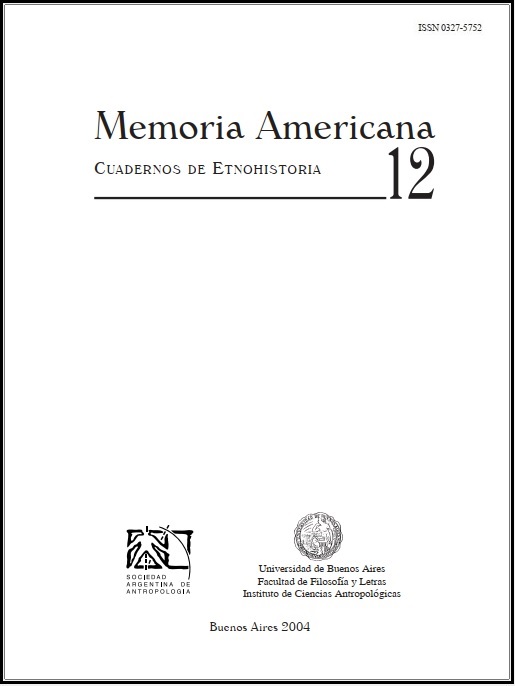The Jesuits at Lake Nahuel Huapi: approaches to a brief mission in Patagonia (1669-1717)
Abstract
The brief existance of the mission "Nuestra Señora del Nahuel Huapi" (1669-1717) was a continuation of the Jesuit project based on Chiloé Island. Devastated twice, their missonaries martyred, the mission was a sign of indigenous resistance, beyond the Andes, to the project of conversion and "civilization" originated in the Kingdom of Chile. The "poyas" resistence to the mission not only responded to the political, social and economic scenario of the Araucanía, or to the indigenous jealousy to save their territories. The reaction was also linked to anthropological, cultural and theological aspects that triggered it. The construction of a stereotyped image of the Patagonic Indian revealed discrepancies about the limits of "conversion" and the access to baptism for those who feared the missionary incursions on their territories.Downloads
References
Acosta, José de 1954. Procuranda Indorum salute o Predicación del Evangelio en las Indias (T LXXII). Madrid, Biblioteca de Autores españoles.
Arroyo, Gonzalo 1993. La justicia como camino para vivir la fe. Mensaje 1593-1993 Jesuitas en Chile 420: 190-196. Santiago de Chile, Mensaje.
Avellaneda, Mercedes 1997. Poder y conflictos religiosos por el control de las reducciones en el Paraguay colonial. Memoria Americana 6: 142-170. Buenos Aires, Facultad de Filosofía y Letras, Universidad de Buenos Aires.
Azcazubi, Miguel de 1846. Informe cronológico de las misiones del Reino de Chile, hasta 1789. En Gay, Claudio; Documentos de la Historia física y política de Chile, tomo I. París, Mauld y Renou.
Casanova Guarda, Holdenis 1994. Diablos, brujos y espíritus maléficos. Chillán, un proceso judicial del siglo XVIII. Temuco, Universidad de la Frontera.
Covarrubias, Antonio de 1846. Memorial dirigido a la Junta de misiones. En Gay, Claudio; Documentos de la Historia física y política del Reino de Chile, tomo I. París, Mauld y Renou.
Enrich, Francisco 1891. Historia de la Compañía de Jesús en Chile. Barcelona, Rosales.
Espiñeira, Pedro Ángel [1758] 1988. Relación del viaje y misión a los pehuenches. En Pinto Rodríguez, Jorge y otros; Misioneros en la Araucanía. Temuco, Universidad de la Frontera.
Foerster, Rolf 1993. Introducción a la religiosidad mapuche. Santiago de Chile, Universitaria.
González de Agüero, Pedro 1791. Descripción e historial de la Provincia y Archipiélago de Chiloé en el Reino de Chile y Obispado de Concepción. Madrid, Benito Cano.
Harrington, Tomás 1946. Contribución al estudio del indio Gününa Küne. Revista del Museo de La Plata (nueva serie) II, Antropología 14: 237-275. La Plata, Instituto del Museo.
Irurtia, María Paula 2002. La visión de los indios respecto de los “cristianos” y “huincas” en el norte de la Patagonia, siglos XVIII y XIX. En Nacuzzi, Lidia (comp.); Funcionarios, diplomáticos, guerreros. Miradas hacia el otro en las fronteras de pampa y patagonia (siglos XVIII y XIX): 247-287. Buenos Aires, Sociedad Argentina de Antropología.
Laguna, Felipe de la [1704] 1930. Carta al Superior de la Nueva misión de la Compañía de Jesús en Sudamérica en Nahuel Huapi hacia el estrecho de Magallanes. El Río de la Plata visto por viajeros alemanes del siglo XVIII. Revista del Instituto Geográfico del Uruguay 7: 231-235. Montevideo.
Mandrini, Raúl 1997. La frontera y la sociedad indígena en el ámbito pampeano. Anuario del Instituto de Estudios históricos y sociales 12: 23-34. Tandil, Universidad del Centro de la Provincia de Buenos Aires.
Martini, Mónica 1993. El indio y los sacramentos en Hispanoamérica colonial. Buenos Aires, Prehisco-CONICET.
Mascardi, Nicolás [1670] 1693. Carta relación. En Vignati, Milcíades; Antecedentes para la protoetnografía del Norte de la Patagonia. Boletín de la Academia Nacional de la Historia 34(2): 495-528. Buenos Aires, Academia Nacional de la Historia.
Menéndez, Francisco [1791-92] 1900. Diario para descubrir la Laguna de Nahuel Huapi (1791- 92). Fonk, Francisco. Viajes de Fray Francisco Menéndez. Valparaíso, Niemeyer.
Molina, Juan Ignacio [1795] 1878. Historia natural y civil de Chile. Libro IV. En Medina, J.; Colección de Historiadores de Chile y Documentos relativos a la historia nacional XI, Santiago, Mercurio.
Nacuzzi, Lidia 1998. Identidades impuestas. Tehuelches, aucas y pampas en el Norte de la Patagonia. Buenos Aires, Sociedad Argentina de Antropología.
Nacuzzi, Lidia 2000. Estrategias sociales en una situación de contacto. El caso del Norte de la Patagonia. Boccara, Guillaume y Sylvia Galindo (eds.); Lógica mestiza en América: 139-163. Temuco, Instituto de Estudios Indígenas.
Nofri, María Clarisa 1998a. El rol de los shamanes en las reducciones jesuitas del área pampeana (mediados del siglo XVIII). Segundas Jornadas de Arqueología histórica y de contacto del centro oeste de la Argentina y Seminario de Etnohistoria. Universidad Nacional del Río Cuarto.
Nofri, María Clarisa 1998b. La elaboración de estrategias de resistencia-permanencia de los indígenas ranqueles frente al establecimiento de las misiones franciscanas como mecanismos de dominación (1868-1880). XII Jornadas de investigación de la Facultad de Ciencias Humanas. Santa Rosa, Universidad de la Pampa, 4-6 noviembre de 1998.
Olivares, Miguel de 1878. Historia de la Compañía de Jesús en Chile (1593-1736). Colección de Historiadores de Chile y documentos relativos a la Historia Nacional. T VII. Santiago de Chile, Mercurio.
Pinto Rodríguez, Jorge 1988. Frontera, misiones y misioneros en Chile. La Araucanía, 1600-1900. En Pinto Rodríguez, Jorge et al.; Misioneros en la Araucanía, 1600- 1900. Un capítulo de Historia fronteriza en Chile: 17-121. Temuco, Universidad de La Frontera.
Pinto Rodríguez, Jorge 2000. De la inclusión a la exclusión. La formación del estado, la nación y el pueblo mapuche. Santiago de Chile, Instituto de Estudios Avanzados.
Pratt, Mary Louise 1997. Ojos imperiales. Literatura de viajes y transculturación. Buenos Aires, Universidad Nacional de Quilmes.
Santamaría, Daniel 1994. Del Tabaco al incienso. Reducción y conversión en las Misiones Jesuitas de las selvas sudamericanas. Siglos XVII y XVIII. San Salvador de Jujuy, Centro de Estudios indígenas y coloniales, Universidad Nacional de Jujuy.
Salas, José Perfecto de 1963. Informe sobre el reino de Chile. En Donoso, Ricardo; Un letrado del siglo XVIII, el Dr. José Perfecto de Salas. Buenos Aires, Facultad de Filosofía y Letras, Universidad de Buenos Aires.
Sánchez, Sebastián 2004. Obstáculos para la evangelización en las misiones jesuitas y franciscanas de la Norpatagonia (1650-1794). Tesis doctoral (en evaluación). Buenos Aires, Universidad del Salvador.
Sánchez Labrador, José [1772] 1936. Los indios pampas, puelches, patagones. Buenos Aires, Viau y Zona.
Saranyana, Joseph (dir.) 1999. Teología en América Latina. Desde los orígenes a la Guerra de Sucesión (1493-1715), Volumen I. Madrid, Iberoamericana-Vervuert.
Storni, Hugo 1980. Catálogo de los jesuitas de la Provincia del Paraguay. Cuenca del Plata, 1585-1768. Roma, Institutum Historicum.
Sweet, David 1995. The Ibero- American Frontier Misión in Native American History. Langer, Erick y Robert Jackson (eds.); The New Latin American misión History: 1-47. University of Nebraska Press, Lincoln and London.
Techo, Nicolás del 1897. Historia de la Provincia del Paraguay de la Compañía de Jesús. Madrid, Uribe.
Valdes Busnter, Gustavo 1993. Las riquezas de los antiguos jesuitas de Chile. Mensaje 1593-1993. Jesuitas en Chile 420: 243-245. Santiago de Chile, Mensaje.
Vignati, Milcíades 1963. Antecedentes para la protoetnografía del Norte de la Patagonia. Boletín de la Academia Nacional de la Historia 34(2): 495-528. Buenos Aires, Academia Nacional de la Historia.
Villarreal, Joaquín de [1752] 1876. Informe a Fernando VI sobre contener y reducir a la debida obediencia los indios del reino de Chile. Colección de Historiadores de Chile y documentos relativos a la Historia Nacional X. Santiago de Chile, Mercurio.
Wilde, Guillermo 1999a. ¿Segregación o asimilación? La política indiana en América meridional a fines del período colonial. Revista de Indias 217: 619-644. Madrid, CSIC.
Wilde, Guillermo 2000. Se hace camino al andar: el análisis de los procesos de formación de identidades socioculturales a fines del período colonial. Memoria Americana 9: 235-252. Buenos Aires. Instituto de Ciencias Antropológicas, Facultad de Filosofía y Letras, Universidad de Buenos Aires.
Los derechos de autor son cedidos a Memoria Americana. Cuadernos de Etnohistoria, no obstante los autores podrán recuperarlos y reproducir su trabajo en otros medios o formatos previo envío de solicitud al Comité Editorial. En tales casos, deberá citarse a Memoria Americana. Cuadernos de Etnohistoria como primera publicación del trabajo y el mismo queda bajo una licencia Creative Commons CC BY NC SA 3.0 Attribution- Non Commercial -ShareAlike 3.0, la cual provee libre acceso inmediato a sus contenidos pues se rige por el principio según el cual hacer disponible -en forma gratuita- la investigación al público fomenta un mayor intercambio de conocimiento a nivel global.
Los autores deberán remitir el siguiente formulario de cesión de derechos y compromiso de originalidad:
Cesión de derechos y compromiso de originalidad
Al Comité Editorial de Memoria Americana, Cuadernos de Etnohistoria
Por la presente declaro ser el autor del trabajo titulado (nombre del artículo), el mismo es original y propio y no ha sido publicado en ningún formato o soporte con anterioridad.
En caso de ser aceptado para su publicación en Memoria Americana. Cuadernos de Etnohistoria (número/año) cedo los derechos editoriales que me corresponden por el aludido artículo para su publicación en todos los formatos que posea la mencionada revista.
Si quisiera publicar este artículo a través de otro editor o en otro lugar me comprometo a solicitar el correspondiente permiso por escrito al Comité Editorial de Memoria Americana. Cuadernos de Etnohistoria. De ser afirmativa la respuesta del Comité Editorial me comprometo a lo siguiente:
- especificar lugar, editorial y fecha de la primera publicación del artículo en la nueva publicación
- realizar esta republicación sólo luego de transcurridos un año calendario desde la fecha de la presente nota de cesión de derechos
FIRMA
Aclaración











